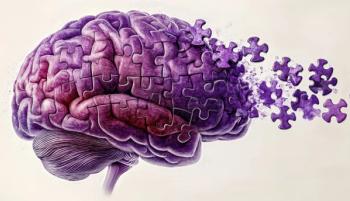
Cognitive Impairment in Patients Receiving Cancer Chemotherapy
Anxiety and depression are the most often cited problems related to a cancer diagnosis, because receiving this diagnosis is often very frightening. Feeling sad, worrying relentlessly, and being unable to experience pleasure often lead people to feel that they may be on the path to losing their minds. However, in the past few years a more subtle phenomenon has been identified related to cognitive deficits allegedly associated with chemotherapy treatment, sometimes called chemobrain.
April 2006, Vol. XXIII, No. 5
First I lose my health with thiscancer, and now I am losing mymind. For a number of reasons,this is a relatively common sentimentamong patients with cancer. Anxietyand depression are the most often citedproblems related to a cancer diagnosis,because receiving this diagnosis isoften very frightening. Feeling sad,worrying relentlessly, and being unableto experience pleasure often lead peopleto feel that they may be on the path tolosing their minds. However, in thepast few years a more subtle phenomenonhas been identified related tocognitive deficits allegedly associatedwith chemotherapy treatment, sometimescalled chemobrain.1,2
Case report
Kim, a 38-year-old woman withbreast cancer, underwent surgical removalof the tumor and then a courseof adjuvant chemotherapy. When shereturned to work as an accountant,she noticed that in addition to beingfatigued, she was not feeling as sharpmentally as she did previously. Taskstook her much longer to complete, andshe found she had to focus on one taskat a time to complete it, or she wouldget distracted and feel as if she had tostart from scratch.
She was concerned about herannual review with her supervisor,because it seemed clear to her that herproductivity had slipped. Others in heroffice picked up the slack withoutcomplaint, but Kim knew somethingwas not right. Kim initially felt that herfatigue was causing her to have concentrationproblems. However, she soonrealized that having to do a task 2 or 3times and working harder to be organizedmay have been contributing toher sense of fatigue and frustration.
Interestingly, the chemobrain phenomenonhas been studied mainly inwomen with breast cancer, perhapsbecause younger and middle-agedwomen may have been more vocalabout some of the sequelae when tryingto return to lives with multiple responsibilities.In addition, there has beenwidespread interest in the psychologicalimpact of breast cancer. It is importantto understand the cognitive deficitsthat may be caused by chemotherapyand what impact these deficits may haveon survivors' educational and careerdecisions, general quality of life, and ability to make informed treatmentdecisions.3
Indeed, for patients who are pursuingoptions on managing their disease,such cognitive decline can interfere withtheir ability to make well-informedtreatment decisions. When making suchdecisions, patients must be able toattend to and understand variouscomplex treatment options. They alsoneed the cognitive ability and flexibilityto make adequate adjustments intheir lifestyle to accommodate theimpact of the disease or side effects oftreatment.
Cognitive decline, broadly speaking,not only diminishes quality of life(potentially impinging on enjoymentof even sedentary activities such as readingor watching television), but manycancer survivors also are concernedabout being able to return to their jobsand function as competently as theydid before the cancer treatment.
Younger cancer survivors are oftenconcerned about being able to continueor complete their studies in schooland be competitive in their careers. Forall cancer survivors, the cognitiveeffects of chemotherapy may becomemore salient the longer they surviveafter cancer treatment. The cognitiveimplications of treatments may be ofparticular importance to older patientsbecause of their increased susceptibilityto cognitive loss because of age,comorbidities, and use of polypharmacy.Older patients with cancer mayalready have worries about their cognitionwhich may be slowing down as aresult of normal aging. When the worryof cancer treatment's impact on cognitivefunctioning is added, some olderpatients are left wondering if the treatmentwas really worth it.
A better understanding of theseissues will allow patients, their families,and their health care professionalsto better plan for chemotherapy andits sequelae. An awareness of this problemshould facilitate some treatmentmodifications to minimize detrimentaleffects as well as encourage pursuit ofrehabilitative efforts to address cognitivedeficits that develop.
A better understanding of theseissues will allow patients, their families,and their health care professionalsto better plan for chemotherapy andits sequelae. An awareness of this problemshould facilitate some treatmentmodifications to minimize detrimentaleffects as well as encourage pursuit ofrehabilitative efforts to address cognitivedeficits that develop.
Notable research studies
A number of landmark studies havebegun to explore the cognitive deficitsin those who have received chemotherapy.For the most part, these studieshave had small sample sizes and havefocused primarily on women with breastcancer. The earliest studies were crosshealthy sectional but had some limitations.
Wieneke and Dienst4 assessed theneuropsychological functioning of 28women with stage I and II breast cancerafter the completion of chemotherapy.They found that patients scored significantlybelow age-, education-, andgender-corrected test norms in verbaland visual memory, mental flexibility,speed of processing, attention, concentration,visuospatial ability, and motorfunction. These levels of impairmentwere unrelated to depression, type ofchemotherapy, and length of time sincetreatment.
van Dam and associates5 assessedthe prevalence of cognitive deficits inwomen with high-risk breast cancerwho were randomly assigned to receivehigh-dose (n = 34) or standard-dose(n = 36) chemotherapy plus tamoxifen(Nolvadex, Soltamox). They alsoincluded a control group (n = 34) ofwomen with stage I breast cancer whowere not undergoing chemotherapy.
The researchers found that 32% and17% of women who had received highdoseand standard-dose chemotherapy,respectively, were cognitively impaired,while only 9% of those who did notreceive chemotherapy were cognitivelyimpaired.5 There were no differencesdetected in specific domains ofcognitive functioning. This was thefirst study to use a randomized designas well as a control group that did notreceive chemotherapy. As a result, thisstudy controlled for the psychologicalburden of having cancer and undergoingtreatment.
In the Netherlands, Schagen andcoworkers6 looked at patients withbreast cancer, comparing the cognitivedeficits in women who receivedchemotherapy following surgery (n =39) with those in women who receivedradiation therapy following surgery(n = 19). The researchers noted significantlymore cognitive impairment inthose women who received chemotherapy(28% overall) than in women inthe control group (12%). The impairmentwas unaffected by anxiety, depression,fatigue, or length of time sincetreatment. The specific domains affectedwere attention, mental flexibility,speed of information processing, visualmemory, and motor function.
Brezden and coinvestigators2 studiedpatients with breast cancer who werereceiving adjuvant chemotherapy (n =31), patients with breast cancer who hadcompleted adjuvant chemotherapy amedian of 2 years earlier (n = 40), and crosshealthycontrols (n = 36). Comparedwith healthy controls, the patientsreceiving chemotherapy performedpoorly on the cognitive functioning test.These deficits were seen primarily inthe memory and language domains. Inaddition, more patients in the 2chemotherapy groups than in the controlgroup were found to have moderate andsevere cognitive malfunctioning. Theresearchers believed these differenceswere not due to mood disturbances.2
Ahles and colleagues3 looked atcognitive deficits in long-term survivors(greater than 5 years post-treatment) ofbreast cancer (n = 35) and lymphoma(n = 36) who were treated with chemotherapycompared with those survivorswho did not receive chemotherapy(n = 57). They found clear yet subtlecognitive functioning deficits in thosewho received systemic chemotherapy,even when controlling for age andeducational level. These differenceswere seen mainly in verbal memory andpsychomotor functioning. Although theeffects may have felt significant to thepersons involved, they were rather subtlein group comparisons.
Wefel and colleagues7 conductedthe first longitudinal study in womenwho received standard-dose adjuvantchemotherapy for breast cancer. Theseresearchers assessed 18 women beforethey started chemotherapy, at 3 weeks,and then at 1 year after they had startedit. The researchers found that nearlyone third of women in the trial hadimpaired cognitive functioning beforechemotherapy. A subset of women(61%) experienced a decline in cognitivefunctioning at 3 weeks. The primarydomains affected were attention, learning,and processing speed. At the1-year assessment point, 50% of thepatients who had experienced deteriorationshowed improvement in cognitivefunctioning, while 50% showedstabilization of cognitive functioning.
Taken as a group, these studies indicatethat chemotherapy can have asignificant negative impact on cognitivefunctioning. However, the magnitudeof these effects and the specificdomains affected by the chemotherapyhave been inconsistent across studies.The domains of psychomotorfunctioning and memory have been themost consistently implicated, but evenfor these domains, the results are notentirely consistent across studies.
In a more recent meta-analysis,Jansen and colleagues8 examined results from 16 studies in an attempt todetermine the effect size of the impactof chemotherapy on various domainsof cognitive functioning. In this analysis,the authors specifically comparedthe impact on patients undergoingchemotherapy with normative data, datafrom healthy controls, and baselinescores (from longitudinal studies).These authors found that visual memorywas the one domain that showed significanteffect size (small to medium effect)across these 3 comparison groups
When compared with normative data,this meta-analysis indicated that thedomains of executive functioning, informationprocessing speed, verbalmemory, and visual memory were allaffected by chemotherapy. Interestingly,effect sizes for all domains were in anegative direction (although these weresmall effects and not all were significant),suggesting that chemotherapyhas a broad and universal adverse impacton cognition. The authors point out thatalthough these effect sizes are small,they will most likely become significantas more studies and subjects areincluded in meta-analyses. The importanceof defining the specific area ofcognitive functioning affected bychemotherapy is to direct and informinterventions to best help cancer patientswho undergo chemotherapy.
Interestingly, most of the studies inthis area have been conducted withwomen who have breast cancer and thetypes of chemotherapy used for thatcondition. A relatively new research directionis to assess cognitive deficits inmen who are receiving hormonal therapyfor prostate cancer. The existingstudies have small sample sizes with inconsistentresults; however, they seemto indicate that subtle but subjectivelyimportant cognitive difficulties are experiencedby many of these men. Thesestudies implicate the specific domainsof visuospatial abilities, reaction time,and possibly executive functioning.
Conclusion
Understanding the cognitive effects ofcancer therapies is a relatively recent butvital field of inquiry. Persons who receivecancer treatments are often trying toweigh the benefits, risks, and shortcomingsof particular regimens. It is noteasy to balance longevity survival statisticsagainst quality of life domains, whichinclude changes in concentration thatmight affect job and social performance.However, being able to assess accuratelywhich patients may be more vulnerableand to which types of cognitivedeficits they are vulnerable may enhancetreatment decision making as well aspatients' ability to cope with and receiverehabilitation for such side effects.
Dr Nelson is clinical instructor in the departmentof psychiatry and behavioral sciences atMemorial Sloan-Kettering Cancer Center, NewYork.
Dr Roth is an associate attending psychiatristat Memorial Sloan-Kettering Cancer Center.The authors have no conflicts to disclose concerningthe subject matter of this article.
References
1. Ahles TA. Chemo brain: it's not in your head.Presented at: American Cancer Society 42nd AnnualScience Writers' Seminar; March 28, 2000; Tampa,Fla.
2. Brezden CB, Phillips KA, Abdolell M, et al. Cognitivefunction in breast cancer patients receiving adjuvantchemotherapy. J Clin Oncol. 2000;18:2695-2701.
3. Ahles TA, Saykin AJ, Furstenberg CT, et al. Neuropsychologicimpact of standard-dose systemicchemotherapy in long-term survivors of breast cancerand lymphoma. J Clin Oncol. 2002;20:485-493.
4. Wieneke MH, Dienst ER. Neuropsychological assessmentof cognitive functioning following chemotherapyfor breast cancer. Psycho-Oncology.1995;4:61-66.
5. van Dam FS, Schagen SB, Muller MJ, et al.Impairment of cognitive function in women receivingadjuvant treatment for high-risk breast cancer:high-dose versus standard-dose chemotherapy. JNatl Cancer Inst. 1998;90:210-218.
6. Schagen SB, van Dam FS, Muller MJ, et al. Cognitivedeficits after postoperative adjuvant chemotherapyfor breast carcinoma. Cancer. 1999;85:640-650.
7. Wefel JS, Lenzi R, Theriault RL, et al. The cognitivesequelae of standard-dose adjuvant chemotherapyin women with breast carcinoma: results of aprospective, randomized, longitudinal trial. Cancer.2004;100:2292-2299.
8. Jansen CE, Miaskowski C, Dodd M, et al. A metaanalysisof studies of the effects of cancer chemotherapyon various domains of cognitive function. Cancer.2005;104:2222-2233.
Newsletter
Receive trusted psychiatric news, expert analysis, and clinical insights — subscribe today to support your practice and your patients.







